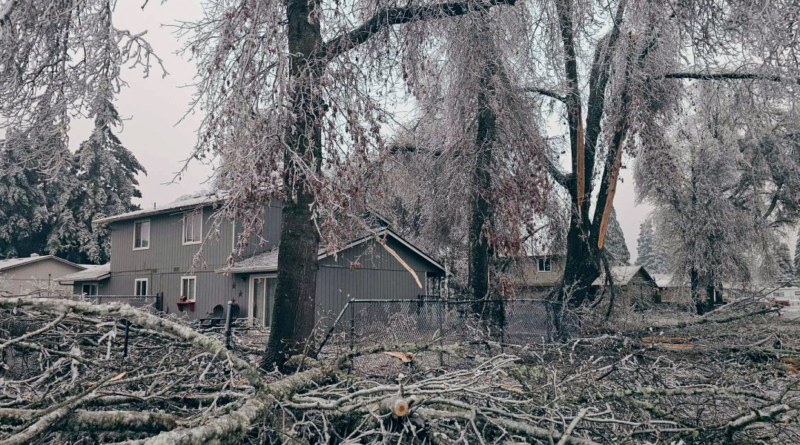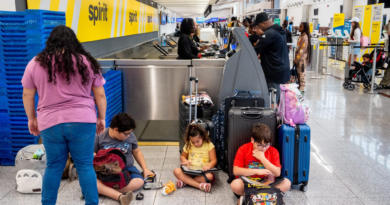Deadly January storms have turned U.S. roads into icy death traps, frozen people to death from Oregon to Tennessee and sent a plane skidding off a taxiway
Storms that have turned roads into icy death traps, frozen people to death from Oregon to Tennessee and even sent a plane skidding off a taxiway were expected to sock both coasts with another round of weather chaos on Friday.
New York City — which only on Tuesday saw its first snow in more than two years — was in the headlights as the National Weather Service laid out warnings of a possible 3 to 5 inches (7.6 to 12.7 centimeters) of snow through Friday in the state and portions of New Jersey and Pennsylvania.
On Thursday, an American Airlines plane slid off a snowy taxiway in Rochester, New York, after a flight from Philadelphia. No injuries were reported.
On the West Coast, Oregon’s governor declared a statewide emergency Thursday night after requests for aid from multiple counties “as they enter the sixth day of severe impacts” from weather marked by freezing rain.
Thousands of residents have been without power since Saturday in parts of Oregon’s Willamette Valley after an ice storm caused extensive damage.
“We lost power on Saturday, and we were told yesterday that it would be over two weeks before it’s back on,” said Jamie Kenworthy, a real estate broker in Jasper in Lane County.
“We do have a generator that we got last year, and right now it’s running an oil plug-in heater,” she said. “We also have a natural gas stove, and I’ve been running two of the burners to try to help heat up the house.”
In the past two weeks, storms have blasted much of the U.S. with rain, snow, wind and frigid temperatures, snarling traffic and air travel and causing at least 45 deaths.
That included three people electrocuted Wednesday by a downed power line in Portland, Oregon. A man trying to get out of a parked car covered by the line died with a baby in his arms after slipping on the icy driveway and hitting the live wire. The baby survived.
His pregnant 21-year-old girlfriend and her 15-year-old brother died when they tried to help. Their father, Ronald Briggs, told KGW-TV that he helplessly watched their deaths.
“I have six kids. I lost two of them in one day,” he said.
Crews had made steady progress restoring power to tens of thousands of customers in Oregon after back-to-back storms, but by Thursday night more than 79,000 were without electricity, according to the website poweroutage.us.
Portland Public Schools canceled classes for the fourth straight day amid concerns about icy roads and water damage to buildings, and state offices in Portland were also ordered closed Friday.
Bitter weather continued in the South, where a new layer of ice formed over parts of Tennessee on Thursday — part of a broader bout of cold sweeping the country.
Authorities blamed at least 14 deaths in Tennessee on the system, which dumped more than 9 inches (22.8 centimeters) of snow since Sunday on parts of Nashville, a city that rarely see such accumulations. Temperatures also plunged below zero (minus 17.7 Celsius) in parts of the state, creating the largest power demand ever across the seven states served by the Tennessee Valley Authority.
The dead included a box truck driver who slid into a tractor-trailer on an interstate, a man who fell through a skylight while cleaning a roof, and a woman who died of hypothermia after being found unresponsive in her home.
On Thursday, Will Compton of the nonprofit Open Table Nashville, which helps homeless people, stopped his SUV outside the Country Music Hall of Fame and Museum to hand out warm hats, blankets, protein drinks and socks as icy rain fell.
“People who are poor and people who are homeless are getting hit the hardest,” Compton said.
Aaron Robison, 62, has been staying at one of the city’s warming centers and said the cold wouldn’t have bothered him when he was younger. But now with arthritis in his hip and having to rely on two canes, he needed to get out of the cold.
“Thank God for people helping people on the streets. That’s a blessing,” he said.
In Mississippi’s capital city, an estimated 12,000 customers were dealing with low water pressure Thursday, another setback for Jackson’s long-troubled water system.
Pipe breaks accelerated Wednesday when the frozen ground began to thaw and expand, putting pressure on buried pipes, Jackson water officials said. The water system experienced increased pressure due to a spike when people filled their bathtubs in response to what officials called a “deliberate misinformation campaign” on social media about the city’s water supply, Jackson water manager Ted Henifin said.
Since extreme cold weather set in last week, more than 60 oil spills and other environmental incidents have been reported in North Dakota’s Bakken oil fields, where regulators say wind chills as low as minus 70 degrees (minus 56.6 C) have strained workers and equipment, making accidents more likely.
In Washington state, five people — most of them presumed homeless — died from exposure to cold in just four days last week in Seattle as temperatures plummeted to well below freezing, the medical examiner’s office said.
In Kansas, authorities were investigating the death of an 18-year-old whose body was found Wednesday in a ditch not far from where his vehicle had become stuck in snow.



